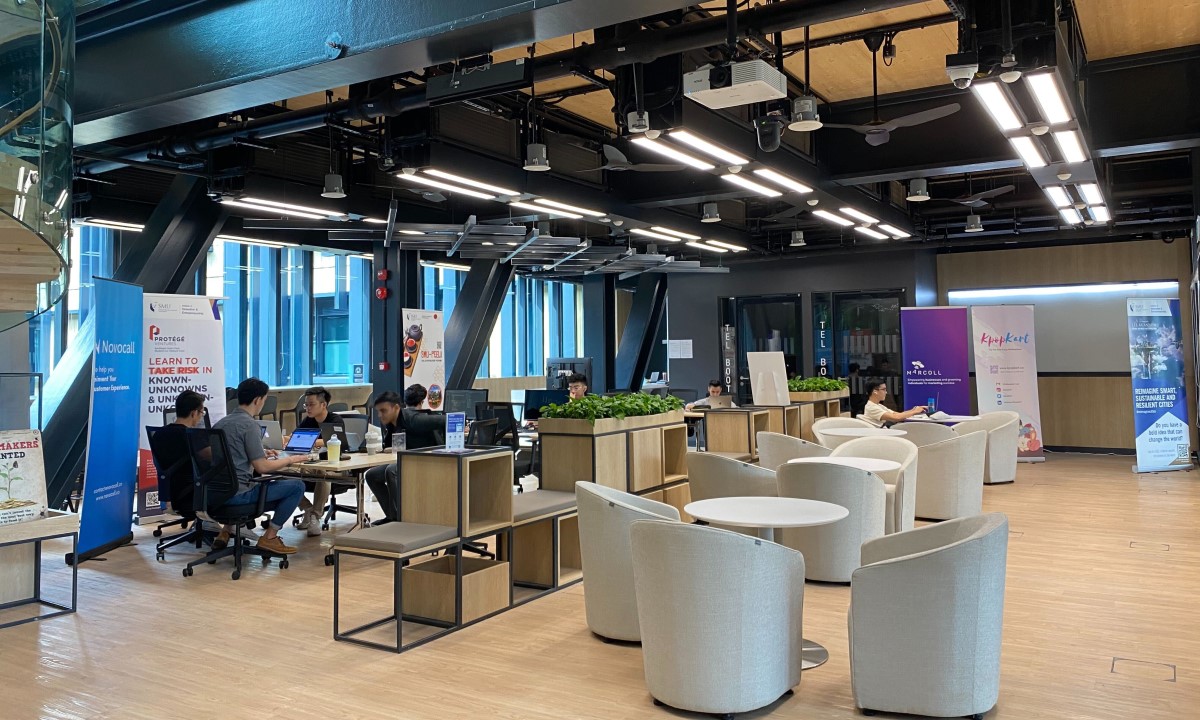Entrepreneurship boom: How starting a business is gaining traction during a downturn

In 2021, SMU welcomed its largest cohort of early-stage start-ups into its Institute of Innovation and Entrepreneurship (IIE) Business Innovations Generator (BIG) programme.
The biannual programme received more than 120 applications, out of which 43 start-ups were eventually selected. To qualify, applicants were assessed based on the viability of their business models, validated market needs and potential, as well as the attributes of the founders, which included coachability, integrity, grit and their sense of community orientation. Not to mention, having to pitch their business plans to a panel of evaluators made up of IIE’s Entrepreneur-in-Residence, mentors, venture capitalists and industry experts, which makes up part of the selection process as well.
Interestingly, while the pandemic has posed several challenges to IIE’s high-touch approach, the BIG programme still received its largest number of applicants and helped launch its biggest pool of start-ups last year.
Ms Shirley Wong, Entrepreneur-in-Residence at IIE talks about how the pandemic has motivated young entrepreneurs to take the leap of faith, and how the school is helping these new founders in their journey.
Has the pandemic turned more people into entrepreneurs?
For the uninitiated, the IIE BIG incubator programme is a founder-centred programme that “supports coachable founders interested in entrepreneurship and commits to developing the SMU start-up ecosystem”, says Ms Wong. More importantly, the programme is also open to all, including non-SMU and SMU students, alumni and staff.
So, what could have led to the increase in applications for the 2021 batch? Was the pandemic a contributing push factor?
Just as people might take time off to go back to school to gain new knowledge when times are slow, the same could be said for those who might choose to pursue new options, such as starting new business ventures.
“When the economy slows down, many companies will shelve their extension plans, salary and bonuses might be affected and thus contribute to a lack of motivation at work. This might encourage people to try the entrepreneur route,” Ms Wong explains.
However, Ms Wong also believes that the increase in applications could be due to the programme’s strong brand awareness, built and strengthened over the years. “The programme has seen some good BIG alumni start-ups gaining traction and media attention. Some of these include SimplyGood, TurtleTree, Magorium, Bondevalue, Friz and Insect Feed Technologies,” she explains. “These success stories, coupled with word-of-mouth and referral by past BIG participants who have benefitted from the programme, helped boost the number of applicants.”
For instance, SimplyGood (also known as UglyGood) was created based on the technology of recycling food waste into raw materials such as essential oils, livestock feed and cleaning agents. With the onset of the pandemic, the quick-thinking team managed to pivot and capture an opportunity by using the same technology to start a new product line of hand sanitisers and disinfectants. At the same time, the founders also distributed their products for free to social enterprises in Singapore, benefitting over 7,000 beneficiaries.
On the other hand, Insect Food Technologies, a company that transforms food waste into insect protein and insect oil for pet and aquaculture feed and organic fertiliser, won the Social Enterprise Start-Up of the Year at the 6th biennial President’s Challenge Social Enterprise Awards (PCSEA) in December 2021. The President’s Office conferred this prestigious accolade to honour exceptional social enterprises for their contribution to the local community.
Other contributing factors that have attracted many BIG applicants, Ms Wong adds, are the content of the masterclasses, along with sharing sessions, and a strong pool of mentors and industry network.
The result: The 2021 BIG batch was one of the most diverse, with start-ups in sectors like food and beverage, e-commerce, logistics, urban wellness, sustainability, health-tech, edutech and spacetech.
Taking that leap of faith
But Ms Wong adds that “whether someone decides to take the plunge to be an entrepreneur is a multi-dimensional consideration and discussion”. In addition, she states that “starting a business, by itself is challenging even without the pandemic and economic slowdown”.
For instance, business owners must identify “the right market niche and go-to-market strategies, having a product or solution that solves the problem of your target markets, getting the business model correct” are just some of the challenges that can arise.
Change is the only constant
As much as we try to avoid it, change is inevitable. Greek philosopher Heraclitus once said that “change is the only constant in life”. And that is as true as it gets for any start-up journey.
“The entrepreneurship journey is not a straight road. There are times when founders take stock and must do a U-turn or pivot. Changes happen along the way in their pursuit of dreams and after going through market validation. Cliché as it may sound, change is the only constant. And for start-ups, the speed of the change is faster than others,” Ms Wong states.
For instance, many start-ups are often founded by a solo founder or by a team of not more than three co-founders. However, along the way, there are times when co-founders leave, and the journey can get lonely for the remaining founder/founders. Or perhaps due to unforeseeable circumstances, they might have to go back to the corporate world and put their entrepreneurial dreams on hold.
But this is where programmes like BIG come in with their access to resources and networks. In addition, the community of other entrepreneurs embarking on a similar journey, can help by offering peer support.
How BIG prepares entrepreneurs for their start-up journeys
Established in 2009, IIE’s incubator, the Business Innovations Generator (BIG) is akin to a support system that helps aspiring entrepreneurs in their start-up journeys.
According to Ms Wong, the BIG programme is industry-agnostic, building around “providing start-ups especially early-stage start-ups with Masterclasses on Founders Equity, Founders Ethics, Go-to-market Strategies and Fund Raising”. In addition, there are also “ongoing sharing sessions by industry stakeholders as well as successful founders” with the aim to “allow more community sharing” while exposing the start-ups to a “myriad of topics that are of interest and relevance”.
But that’s not all. To help entrepreneurs navigate the world of information and communications technology IIE has also started a Masterclass on Jumpstart PR in 2021 to help start-ups “be more media savvy”, equipping them to be ready for media engagements.
At a glance, this is how the BIG programme helps start-ups:
#1 Equity-free grants
Fact: Start-ups need investments. Through BIG, founders will access various funding options to kickstart and scale their operations. Some options include Startup SG Founder Grant, which provides mentorship support and a capital grant of $50,000; and IIE Acceleration Grant, which provides additional funding of up to $10,000 to start-ups who display potential for growth and development.
#2 Mentors and advisors
Learn from the best. With its network of mentors that includes the likes of seasoned entrepreneurs, industry experts and government officials – Professor Yaacob Ibrahim; David Lee, Non-executive Director of Maybank Singapore; Alvin Poh, founder of Superscaling.com; and Dr Mary Kan, Programme Director of Singapore Biodesign A*STAR, the young entrepreneurs can tap into in these mentors’ industry knowledge, connections and experience to help their start-ups grow.
#3 Masterclasses
Gain knowledge and skills. Through a host of masterclasses and sharing sessions that include theoretical and practical knowledge, founders will learn how to grow their businesses and avoid common pitfalls from industry experts and fellow entrepreneurs.
#4 Office hours
Get one-to-one advice, guidance and feedback. Entrepreneurs are never entirely alone on this start-up journey. During BIG office hours and BIG Legal Clinic, new entrepreneurs can seek advice and guidance about business strategy, key decisions, and next steps from BIG’s advisory panel members.
#5 Entrepass
Not just for Singaporeans, the BIG programme is open to SMU, non-SMU, SMU alumni and staff. For foreign entrepreneurs, the Startup SG Entrepass enables eligible founders to start and operate businesses in Singapore, if they are venture-backed and possess innovative technologies. To qualify, they will need to apply and be accepted into SMU Institute of Innovation & Entrepreneurship’s BIG incubation programme. Alternatively, they need to be one of SMU’s commercialisation projects to qualify.
#6 Downtown co-working space
A place of your own. The BIG incubator, The Greenhouse, is housed within the glass bridge that links SMU Connexion and the School of Law. This collaborative space is where founders can meet with faculty members, practitioners and external stakeholders whilst working on their start-up ideas and business ventures simultaneously.
The path to success
Ms Wong emphasised that for start-ups to succeed, the founders must be ready to “learn through obstacles, create and find opportunities that bring them the desired results”.
“We believe that having an entrepreneurial mindset is one of the most important takeaways. Not everyone needs to be an entrepreneur. However, in any work we do, be it as a founder or an employee, having the right mindset will give us an edge over others,” she explains.
In the end, it is the ability to adapt together with the willingness to accept failure and learn from it, as well as not being afraid to ask, being goal-driven and having empathy to share with others in the community that will allow you to succeed. These, says Ms Wong, are the skills that “graduates” of the BIG programme will take with them should they decide to re-join the corporate world.


